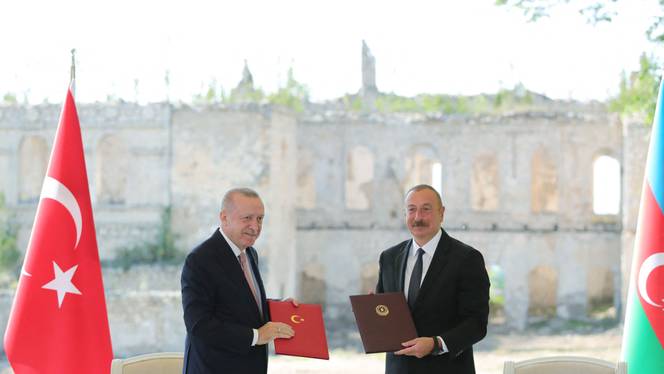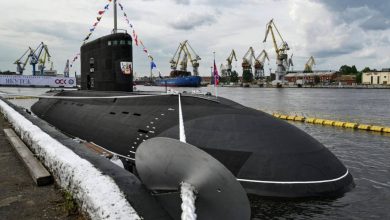This is what you need to know about the Zangezur Corridor

President Erdogan’s recent visit to Azerbaijan put spotlight on the Zangezur Corridor, which will help the regional countries connect via rail and road links.
Days after Turkish President Recep Tayyip Erdogan was reelected on May 28, he travelled to Azerbaijan as part of its first foreign trip after taking the office.
There he held talks with his Azerbaijani counterpart on matters of mutual interest.
But perhaps most importantly, the two leaders emphasized on their commitment to complete the work on Zangezur Corridor – a network of road and railway that connects various countries in the region and realigns relations that have been fraught with years of war and mistrust.
“It’s a peace corridor. It can stimulate economic cooperation among Armenia and Azerbaijan and Türkiye,” says Matthew Bryza, the former US ambassador to Azerbaijan.
Basically the corridor connects Azerbaijan with its landlocked exclave of Nakhchivan autonomous region. Geographically, Nakhchivan is cut off from mainland Azerbaijan by Armenian territory.
Before a recent rapprochement, the two neighbours – Armenia and Azerbaijan – had been at each other’s throats. They have fought bloody wars over border territories as recently as 2020 over the Karabakh, a territory internationally recognised as part of Azerbaijan, and seven adjacent regions.
The corridor allows goods and people to travel back and forth between Azerbaijan and Nakhchivan via Armenia’s Syunik province.
Here’s what you need to know about the corridor:
A quick look into Zangezur’s history
Zangezur is a region that was historically a part of Azerbaijan. But in the 1920s, the then Soviet Union made it part of Armenia.
This deprived Azerbaijan from its only direct land link to Nakhchivan. For years afterwards, Azerbaijani who wanted to travel between the mainland and the autonomous region had to first neighbouring Iran.
A proposal for the corridor remained on the drawing board for years. But it finally began to become a reality after the end of the Second Karabakh War in 2020.
A trilateral ceasefire agreement between Armenia, Azerbaijan and regional powerhouse – Russia – allowed for opening up for railway and road routes, which will cross Armenia.
The Turkic connection
One of the most important aspects of the corridor, which is under various phases of construction, is its link to Türkiye.
The railway runs from Azerbaijani capital Baku, then crosses Armenia while hugging its border with Iran and ends in Kars in Türkiye.
“It is not only a means of opening up transport opportunities between Nakhchivan and the rest of Azerbaijan but also an opportunity to connect the Caspian and Mediterranean basins and Southeast and Central Asia with Europe,” says Ayhan Satiji, Acting Head of Turkic World Research Center, at the Center for Analysis of Economic Reforms and Communications of the Republic of Azerbaijan (CAERC).
Azerbaijan and Türkiye, which share the common Turkic roots, see the corridor as a way to link up with other Turkic states including Kazakhstan, Kyrgyzstan, Uzbekistan and Turkmenistan.
But its benefit could be far-reaching.
“The mega projects by Azerbaijan, Türkiye, do not only serve the interests of overall Turkic world countries, but it could be concluded as a win-win situation for the region,” Satiji tells TRT World.
A boost to Türkiye-Azerbaijani ties
The corridor will go a long way in strengthening the economic and diplomatic ties of Türkiye and Azerbaijan.
The two close allies signed the Shusha Declaration in 2021, which aligns their foreign policy stance on important international matters.
The declaration also touches on the importance of the Zangezur corridor.
“The recent Shusha Declaration represents an alliance agreement that reinforces the bond between these two brotherly countries. The development of the Zangezur corridor is the continuation of the steps toward the realization of the strategic ties,” says Satiji.
Why is Iran against the corridor?
One country which is not happy about the corridor is Iran, which maintains close defence ties with Armenia.
Evidently, Tehran is wary of losing influence as Azerbaijanis would no longer need to commute via the Iranian territory to reach Nakhchivan.
In recent comments, Erdogan specifically pointed out that it wasn’t Armenia which had any issue with the corridor but Iran.
“Regarding the Zangezur Corridor, this is not an Armenian issue. The Zangezur Corridor is an issue with Iran,” Erdogan said on his way back to Türkiye after the Azerbaijan visit.
“I hope that we are able to resolve this issue quickly. If they had taken a positive stance on this, Türkiye, Azerbaijan, and Iran would have been integrated via land and sea routes, and perhaps the Beijing-London route would have been opened.”





